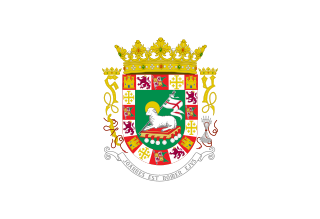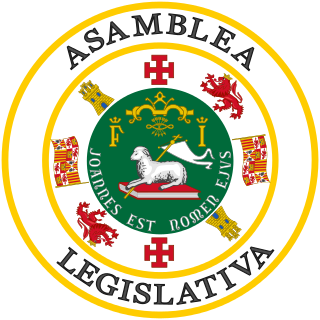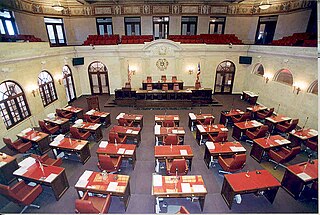
The politics of Puerto Rico take place in the framework of a democratic republic form of government that is under the jurisdiction and sovereignty of the United States Congress as an organized unincorporated territory. Since the 1898 invasion of Puerto Rico by the United States during the Spanish–American War, politics in Puerto Rico have been significantly shaped by its status as territory of the United States. The nature of Puerto Rico's political relationship with the United States is the subject of ongoing debate in Puerto Rico, in the United States, the United Nations and the international community, with all major political parties in the archipelago calling it a colonial relationship.

The government of the Commonwealth of Puerto Rico is a republican form of government with separation of powers, subject to the jurisdiction and sovereignty of the United States. Article I of the Constitution of Puerto Rico defines the government and its political power and authority. The powers of the government of Puerto Rico are all delegated by the United States Congress and lack full protection under the U.S. Constitution. Because of this, the head of state of Puerto Rico is the President of the United States.

Carlos Antonio Romero Barceló was a Puerto Rican politician who served as the governor of Puerto Rico from 1977 to 1985. He was the second governor to be elected from the New Progressive Party (PNP). He also served 2 terms in Congress as the Resident Commissioner of Puerto Rico from 1993 to 2001.
The posts of shadow United States senator and shadow United States representative are held by elected or appointed government officials from subnational polities of the United States that lack congressional vote. While these officials are not seated in either chamber of Congress, they seek recognition for their subnational polity, up to full statehood. This would enfranchise them with full voting rights on the floor of the US House and Senate, alongside existing states. As of 2021, only the District of Columbia and Puerto Rico currently have authorized shadow delegations to Congress.

The governor of Puerto Rico is the head of government of the Commonwealth of Puerto Rico, and commander-in-chief of the Puerto Rico National Guard.

The Senate of Puerto Rico is the upper house of the Legislative Assembly of Puerto Rico, the territorial legislature of Puerto Rico. The Senate, together with the House of Representatives of Puerto Rico, control the legislative branch of the government of Puerto Rico.

The House of Representatives of Puerto Rico is the lower house of the Legislative Assembly of Puerto Rico, the bicameral territorial legislature of Puerto Rico. The House, together with the Senate, control the legislative branch of the government of Puerto Rico.

The Legislative Assembly of Puerto Rico is the territorial legislature of the Commonwealth of Puerto Rico, responsible for the legislative branch of the government of Puerto Rico. The Assembly is a bicameral legislature consisting of an upper house, the Senate normally composed of 27 senators, and the lower house, the House of Representatives normally consisting of 51 representatives. Eleven members of each house are elected at-large rather than from a specific legislative district with all members being elected for a four-year term without term limits.

Luis Guillermo Fortuño Burset is a Puerto Rican politician who served as the governor of Puerto Rico, an unincorporated territory of the United States, from 2009 to 2013.

Elections in Puerto Rico are guaranteed by Article Six of the Constitution of Puerto Rico and the Electoral Code of Puerto Rico for the 21st Century Act. All processes are overseen and managed in whole by the Puerto Rico State Elections Commission; an autonomous agency of the executive branch of the government of Puerto Rico.

José F. Aponte Hernández is an accountant and former Speaker of the House of Representatives of Puerto Rico. He was born in San Juan and obtained a bachelor's degree in Accounting from the University of Puerto Rico at Rio Piedras in 1980.

General elections were held in Puerto Rico on Tuesday, November 4, 2008, to elect the officials of the Government of Puerto Rico that would serve for the next four years, most notably the Governor of Puerto Rico.

Jenniffer Aydin González Colón is a Puerto Rican politician who serves as the 20th Resident Commissioner of Puerto Rico. González has served in leadership positions in the New Progressive Party of Puerto Rico (PNP) and in the Republican Party of the United States. These positions included being the chairwoman of the Puerto Rico Republican Party, speaker and minority leader of the House of Representatives of Puerto Rico, and vice-chair of the PNP. González is the youngest person to be Resident Commissioner and the first woman to hold the role.

The Popular Democratic Party is a political party in Puerto Rico that advocates to continue as a Commonwealth of the United States with self-governance. The party was founded in 1938 by dissidents from the Puerto Rican Liberal Party and the Unionist Party and originally promoted policies on the center-left. In recent years, however, its leaders have described the party as centrist.

Carlos J. "Johnny" Méndez Núñez is a politician from Fajardo, Puerto Rico. He represents District 36 in the Puerto Rico House of Representatives and assumed the role of Majority Leader upon the resignation of Rolando Crespo as a member of the House in February, 2011.
José Ernesto "Pichy" Torres Zamora is a Puerto Rican politician and former Secretary General of the New Progressive Party (PNP). He was a member of the Puerto Rico House of Representatives from June 10, 2010, when he replaced Iris Miriam Ruíz, until 2013. He won a seat in the PR House of Representatives in 2016 and currently he serves as the Speaker Pro Tempore of the Puerto Rico House of Representatives.

The 17th Legislative Assembly of Puerto Rico was the 17th session of the Puerto Rican legislature that met from January 14, 2013 until January 1, 2017. All members of the House of Representatives and the Senate were elected in the General Elections of 2012. The House and the Senate both had a majority of members from the Popular Democratic Party (PPD).

Rafael "Tatito" Hernández Montañez is a Puerto Rican politician affiliated with the Popular Democratic Party (PPD). He is also a Democrat. He has been a member of the Puerto Rico House of Representatives since 2009, representing District 11, which includes the town of Dorado and parts of the towns of Vega Alta and Vega Baja. In the 2020 elections he was re-elected and chosen as speaker of the house in 2021.

General election were held in Puerto Rico on Tuesday, November 8, 2016, to elect the officials of the Puerto Rican government to serve from January 2017 to January 2021, most notably the Governor of Puerto Rico. Ricardo Rosselló was elected governor and Jenniffer González-Colón was elected Resident Commissioner. The elections saw a 23 percentage point drop in turnout and was the lowest voter turnout in Puerto Rican history.

The 2020 Puerto Rico House of Representative election was held on November 3, 2020, to elect the members of the 31st House of Representatives of Puerto Rico, concurrently with the election of the Governor, the Resident Commissioner, the Senate, and the mayors of the 78 municipalities. The winners were elected to a four-year term from January 3, 2021, to January 3, 2025.

















